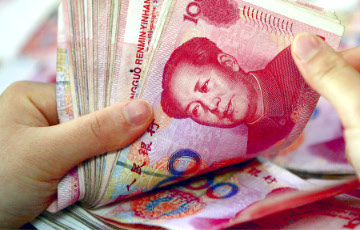Russia Facing Shortage Of Yuans
3- 12.02.2024, 12:07
- 6,532

Due to the stance of Chinese banks.
The refusal of Chinese banks to work with companies from Russia has hit the yuan reserves of Russian credit institutions - they began to decline rapidly.
As of January 1, 2024, domestic banks were holding balances in yuan on correspondent accounts abroad for $6.8 billion, which is 25.7% less than it was in November, RBC quotes data of the Russian Central Bank. This is the minimum figure since June 2022 (then it was $5.9bn).
At that the amount of Chinese currency on Russian banks' correspondent accounts abroad has been falling for the last three months. The peak level of such balances during the last year was recorded on February 1 - $14.1bn.
A more pronounced decline in balances on correspondent accounts abroad may be observed in January, but so far there are no official statistics for this month, says Yuri Belikov, managing director of the Expert RA rating agency. According to him, this indicates a toughening of compliance policy of foreign banks-counterparties in relation to Russian ones.
"Such a scenario entails a reduction in the volume of foreign trade in certain types of goods, a decrease in transaction activity and, as a consequence, a reduction in balances on correspondent accounts abroad. <...> Such a situation can be observed with regard to correspondent accounts in Chinese and Turkish banks," Belikov explained.
The deterioration of yuan liquidity may also be related to the difficulty of repatriating export revenues, believes Mikhail Rodichkin, currency trader at Renaissance Capital.
In late December, U.S. President Joe Biden signed a decree authorising the U.S. Treasury Department to impose sanctions on foreign banks for assisting in transactions with under-sanctioned Russian companies. After that, according to market participants, Chinese banks began limiting settlements. "It is possible that this is due to the growing risk of secondary sanctions for liquidity providers and yuan infrastructure," explained a Kommersant source in a Russian bank.
At the end of January, Chouzhou Commercial Bank, a key Chinese bank for imports to Russia, notified that it was halting operations with Russian companies. Other Chinese banks also limited financial relations with their Russian partners and stopped making payments in dollars.
Against this backdrop, Russia's two biggest banks, Sberbank and VTB, announced a shortage of the yuan in the country. "Yuan lending now is a privilege to be earned in any major Russian bank," said Dmitry Pyanov, VTB's first deputy president-chairman and the bank's chief financial officer.
In response to the yuan shortage, the Central Bank has started conducting currency swap deals with banks. Since the beginning of the year, their volume totalled 35.7 billion yuan, while for the whole of last year it was less than 60 billion yuan. In early February, the currency swap rates exceeded 4% per annum, which is many times more than at the beginning of the year, Kommersant wrote. At the same time, market participants predict a continued shortage of yuan liquidity due to growing demand from importers and sanctions-related restrictions from Chinese banks.










